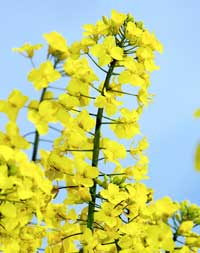Cruiser ‘most comprehensive’ OSR seed treatment yet

A long-awaited new seed treatment has been launched by Syngenta to protect oilseed rape against pests and diseases.
Described as the most comprehensive yet available to UK growers, it should help counter the impact of a poorly recognised disease believed to be capping the country’s output.
Plenty of farmers here have already experienced Cruiser (thiamethoxam + fludioxinil + mefenoxam) via imported seed. About 4% of this season’s UK crop is estimated to have been Cruiser-treated, and market feedback on establishment was particularly good after last year’s difficult autumn, said the firm’s Will Holmes.
“Evidence confirms its strong benefits in terms of better establishment.”
Approval for the novel active ingredient, thiamethoxam (TMX), was originally sought in 2002, and the firm’s Michael Tait acknowledged that delay in getting it to market had lost sales. But since then much more information had been accumulated about its crop boosting properties, “the vigour trigger”, first noticed in soya.
 |
|---|
Will Holmes expects good demand for Cruiser with as much of a quarter of next season’s crops treated with it |
“It leads to a better root system, especially important if we get a dry spring,” said Mr Tait. Plants emerged faster, were more vigorous and tolerant of stresses, as well as being earlier to create canopies and to flower, all of which, on balance, produced higher yields.
The effect, thought to come from the chemical’s effect on plant auxins, had been clearly seen in laboratory experiments using rhizotrones (transparent growing tubes) and in German and Ukrainian field trails. TMX offered clear benefits over Chinook (imidacloprid + betacyfluthrin).
This season that difference had been noticeable in several UK fields split between the two treatments, he added. “Quite a lot of growers have seen it for themselves.”
The mefenoxam (formerly metalaxyl-M) delivered especially good control of downy mildew, which could check crops early, damping off, phoma and alternaria, he noted.
Cruiser also helped control flea beetles, mealy aphids, cabbage root and turnip sawflies. But the Syngenta team expected the most insecticidal benefit would come from its activity against aphids carrying turnip yellows virus TuYV, formerly beet western yellows virus (BWYV).
“It’s a major limitation on achieving biological potential,” said Mr Tait.
 |
|---|
Michael Tait showing the typical symptoms of TuYV which Cruiser can help avoid |
Broom’s Barn’s Mark Stevens agreed, suggesting TuYV was a “forgotten problem” responsible for cutting yields by about a quarter on average.
The virus was carried into oilseed rape mainly by Myzus persicae aphids in the autumn; but the purple/red leaf symptoms were often confused with nutrient deficiency and rarely seen until stem extension, he said.
Monitoring showed that in recent seasons with mild winters up to 70% of those aphids carried the virus. Moreover 90% of them were resistant to most sprayed insecticides, though as yet not those applied as seed treatments.
Such treatments could provide valuable protection for six to 10 weeks until the products ran out of steam through dilution within the plants.
In six Syngenta trials in Germany in 2007 untreated crops ended up with over 90% TuYV infection. In that work Cruiser was more successful at reducing the problem than either Chinook or the recently introduced Modesto (clothianidin + betacyfluthrin) each with thiram, noted Mr Tait.
Trials using artificial covers at Broom’s Barn last autumn also examined the effects of the same seed treatments in droughted soil, and under irrigated conditions and natural rainfall.
In both the latter instances, where germination was not hampered by lack of moisture, Cruiser showed an “early” advantage, noted Dr Stevens.
Five sowings were made, from 24 September to 8 October, and in the first two plants from the Cruiser-treated seeds emerged twice as fast as those given the other treatments.
Cruiser cost £12/ha, so given its yield lift on a 3.3t/ha crop and the saving of not having to spray twice for flea beetle, Mr Holmes calculated its use should return a margin of £88/ha. “That’s £7.60 for every £1 invested.”
Cruiser
- Comprehensive seed treatment for OSR, fodder rape and mustard
- Broad spectrum pest and disease control
- Not for use on broadcast seed
- Has outperformed competitors 70% of time

